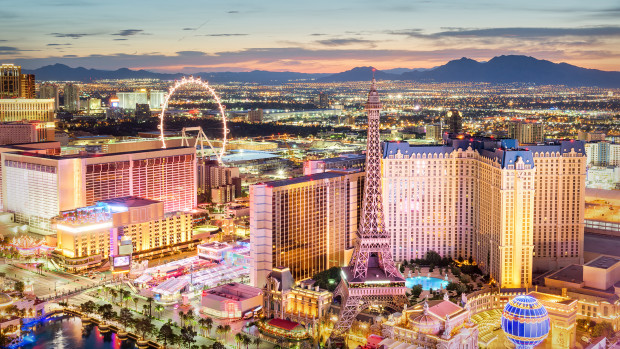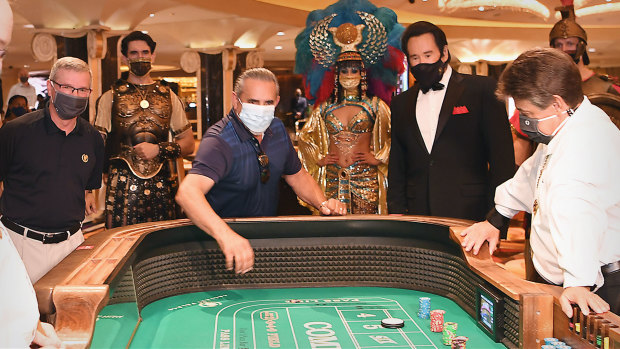
Few things tie the Las Vegas of today to what people think of as classic Las Vegas.
Caesars Entertainment (CZR) -) has certainly paid tribute to the old-school Vegas ethos at its renamed Horseshoe Las Vegas resort casino, located on the center of the Strip. That property takes its name from an iconic downtown casino and even honors the legendary Las Vegas gambling figure Jack Binion with a steakhouse bearing his name.
DON'T MISS: Las Vegas Strip losing 'last of the old-style casinos'
Caesars is up front about how the former Bally's has embraced history, while it also has modernizing the property.
"Horseshoe Las Vegas deals give unbeatable access to a classic experience with a modern flair. Stay center strip at this iconic hotel with a legacy of making it right for the gambler," the company says on the property's website.
But while Horseshoe celebrates old-school Las Vegas, Caesars's oldest property, the Flamingo embodies it. Some of that comes from simple neglect, as the casino operator tried to sell the property last year but was unable to make a deal.
Flamingo, the oldest casino on the Strip, opened in 1946, and while parts of it feel as if they're celebrating Las Vegas, other parts of it seem, well, just old. The casino also hosts a headline act whose history traces back almost to the resort's founding.
Wayne Newton began performing in Las Vegas as a teenager in the 1950s and began headlining the Flamingo in 1963. And while his long-standing residency has brought him on and off the Strip, since 2019 he has been performing at the Flamingo in a theater bearing his name.
Now, the legendary singer will extend his "Wayne: Up Close and Personal" at the Flamingo through June 2024 with 62 added dates.

Image source: Denise Truscello/Getty Images for Caesars Entertainment
An icon of old Las Vegas
Newton, now 81, essentially created the modern residency. In 1999 he signed a 10-year deal with the long-defunct Stardust that saw him perform six shows a week, 40 weeks a year. That kind of commitment, unheard-of at the time, has now become the norm for Las Vegas residencies (albeit not for 40 weeks a year).
Most headline acts in Las Vegas are either contemporary -- Lady Gaga, Katy Perry, Matchbox 20, Bruno Mars, and Adele, to name a few -- or sort of modern nostalgia. Garth Brooks, Sting, Rod Stewart, and the Backstreet Boys aren't cranking out new hits, or even releasing albums for the most part, but aren't really nostalgia acts.
Newton, whose big hits came out in the 1960s and '70s, is an old-school nostalgia act who somehow has translated to enduring all-ages appeal.
Many in the audience may vaguely know 1963's “Danke Schoen” but might be hearing other hits, including, “Daddy, Don’t You Walk So Fast,” “Red Roses for a Blue Lady,” “At This Moment,” “The Letter,” “Summer Wind,” and “Years' for the first time during his Las Vegas shows.
Only Newton, Barry Manilow, who also still headlines in Las Vegas, Dolly Parton, and the late Tony Bennett have shown similar ability to attract audiences across generational lines. Newton has managed to do that over tens of thousands of shows in one city. (The singer performed his 25,000th Las Vegas show as a headliner back in 1996.)
Mr. Las Vegas has been the city's face
More than Elvis Presley or Frank Sinatra, Newton has become the enduring face of Las Vegas. Dubbed Mr. Las Vegas, the singer was one of the first headline acts to return to the stage in Las Vegas after the Strip's forced covid shutdown.
Over the years, the singer has adapted his show to minimize how often he has to cancel performances. His act now includes more stories and the singer plays multiple instruments, in an effort to put less stress on his voice.
That appears to be because Newton understands that a cancellation would let down his fans and that tourists can't easily attend a rescheduled date.
“There are nights that you are vocally better. There are nights that you are not as vocally good. No question about it,” he told Suggest.com.
“But does that mean that the overall project is not entertaining or interesting enough that that would be enough of a reason to cancel it?”







